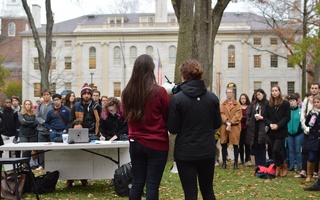A recent email sent by Dean of the College Rakesh Khurana brought welcome news for the University’s fight against sexual assault. In addition to the in-person sexual assault trainings required of incoming freshmen during Opening Days, the College has introduced a new online sexual assault training module that all undergraduates must complete by mid-October.
The training module, which includes a quiz that students must complete at the end, is intended to provide students with information about the College’s policies and the resources it offers to deal with sexual and gender-based harassment. Given the oft-opaque nature of these issues, steps to increase clarity are critical.
We have long called for the University to increase the sexual assault training it provides to students. While in-person training is obviously preferable to an online program, getting this information to students should be the main priority. Critically, the College Title IX coordinators who speak frequently throughout the module emphasize this point when discussing how this new initiative works in tandem with the College’s other efforts.
Though sexual assault is the issue most frequently discussed in this area, the module provides a necessary reminder that Title IX policy also covers other instances of sexual or gender based harassment.
Even as Harvard has taken many commendable steps to ensure students understand what resources are available to them on campus, it is impossible to escape the reality that the issue of sexual assault and the procedures surrounding it are complicated, and understanding them requires more than just one training. When new policies were announced last spring, they were accompanied by complicated flow charts and long documents. This additional online module that students must complete each year represents a substantial step forward.
For survivors of sexual assault at Harvard, the aftermath is both devastating and difficult to navigate. An op-ed recently published in these pages addressed the traumatic experiences of one student who was sexually assaulted on campus. If this new training program is able to prevent even one sexual assault, then it unequivocally will have been worth the 30 minutes required for each student to complete it.
Going forward, administrators should use this initiative as an example of an improved policy on sexual assault. While we still believe that in-person sexual assault trainings should be mandatory for all students at the beginning of each academic year, we commend College administrators for the implementation of this online one. As the sexual assault report reminded us last spring, much work remains to be done.
Read more in Opinion
More Work to Be DoneRecommended Articles
-
 ‘Troubling’ Climate of Sexual Assault: One Year Later
‘Troubling’ Climate of Sexual Assault: One Year Later -
More Than Two Thirds of Harvard Undergrads Complete Sexual Assault Training ModuleSixty-seven percent of Harvard undergraduates have completed the College’s online sexual assault training module, half a year after the school first unveiled the program in September.
-
 Harvard's Sexual Assault Prevention Efforts: 11 Months Later
Harvard's Sexual Assault Prevention Efforts: 11 Months Later -
Harvard Must Do More to Prevent Sexual AssaultWe cannot stand by when cases of sexual assault are reported, but simply checking off boxes and calling our work done is not enough.
-
Harvard College Proceeds with Online Title IX Training for Second YearThe College used input from undergraduate focus groups to update its sexual assault prevention training modules for 2017, according to Title IX Coordinator Emily J. Miller.













